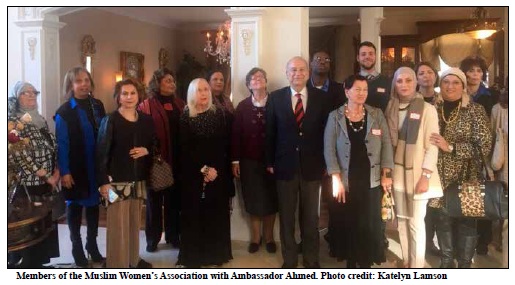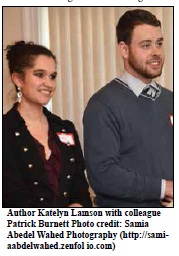Finding the Light: An Afternoon with the Muslim Women’s Association
By Katelyn Lamson
American University School of International Service
Washington

On December 15th, 2016, a group comprised mostly of women, both Muslim and non-Muslim alike, gathered in a beautiful estate along the banks of the Potomac River for a screening of Ambassador Akbar Ahmed’s latest film, Journey into Europe, an exploration of the historical and contemporary influences of Islam on the European continent. The event, organized by the Muslim Women’s Association, featured a diverse range of prominent individuals, hailing from a number of countries, including the United States, Qatar, Egypt, Tunisia, and Bosnia.
Though the film was focusing on Islam in Europe, the themes of the film were just as relevant to the United States. Indeed, across the West, the challenge of coexistence between Muslims and non-Muslims has been palpable, particularly with respect to the topics of immigration and terrorism. As both a student and a member of Ambassador Ahmed’s team, I had frequently witnessed these clashes of ideas firsthand, seeing these debates create substantial rifts between family and friends alike.
As our car made its way through DC and Virginia, I confess I was feeling a little glum. Hate crimes were on the rise across the United States, and it seemed as if every day I found myself in the middle of yet another emotionally charged debate combatting stereotypes of Muslims. I worried that the country I loved so much was slipping further and further away from its promise of liberty and justice for all.
It was perhaps fitting, then, that the screening of the film was to take place less than a mile from Mt Vernon, the sprawling estate of President George Washington, who, like several of the country’s founding fathers, had articulated the themes of religious pluralism. Indeed, a 1797 treaty of peace and friendship between the United States and Tripoli, which was sponsored by George Washington himself, noted that the United States had in itself “no character of enmity against the laws, religion or tranquility of Musselmen [Muslims].” I hoped that, in that tranquil setting, I might find that spirit again.
Following our arrival, Ambassador Ahmed addressed the audience, emphasizing the importance of scholarship in Islam. Indeed, he said, the influences of Islam on Western civilization have largely been forgotten; even Muslims have forgotten this history. Yet since the eighth century, Islamic scholars made substantial contributions to art, literature, philosophy, history, science, and mathematics. The history of Europe is intricately tied to the history of Islamic civilizations, he emphasized. This legacy of scholarship must be rekindled among Muslims in the twenty-first century. After all, Ambassador Ahmed reminded us, the Prophet Muhammad himself had once implored: “The ink of the scholar is more sacred than the blood of the martyr.”
We were shown selected scenes from Journey into Europe, including Ambassador Ahmed’s visit to Spain to explore the history of the Islamic civilization in Andalusia, the influence of Islam in Sicily, and an examination of both the conflict between Muslims and Christians in Bosnia in the late twentieth century and the lasting impact of Islam in the Balkans. The audience was rapt with attention, shedding tears while watching the scenes of war-torn Bosnia and smiling warmly at the expressions of interfaith compassion exuded by those Ambassador Ahmed interviewed.
Following the screening, we gathered in the living room for a discussion of the film over a delicious meal featuring such dishes as chicken pilaf, cheese squares, baklava, and basboosa, prepared by our host, Aida Mady, who is also the founder and owner of Cooking and Beyond, a catering company serving Egyptian cuisine in the DC area. Jan Du Plain, a prominent DC personality, PR and events specialist, and founder of Du Plain Enterprises, had tears in her eyes as she recounted the scenes she had watched; indeed, she said she was overwhelmed by the emotional power of the film. A longtime friend of Ambassador Ahmed’s since the early days following 9/11, she repeated what she had said several times in the past: “He is like the Dalai Lama of the Muslim world and deserves the Nobel Peace Prize.” She felt much hope seeing these efforts to promote peace and tolerance. “We need to keep looking for the light,” she said determinedly.
Amira Dzirlo, a survivor of the Bosnian war who knew some of the individuals featured in the film, echoed Ms Du Plain’s sentiments. The film needs to be distributed as far and wide as possible, she insisted. She was deeply moved by the scenes from Bosnia, as they brought back so many memories. Though the horrors of the war were impossible to forget, she said, we must find a way to make progress. “We need to know how to be in charge of the light.”

ZeinaAlkhalaf, a student at George Mason University pursuing a Master’s in Public Health, eloquently captured the spirit of scholarship among young Muslims. She agreed with Ambassador Ahmed’s assertion that the historical contributions of Islam have largely been erased. Sadly, young Muslims are not exposed to any of this history, she said. Indeed, she concluded, the most important task of the young generation, particularly among Muslims, will be this project.
To me, one of the most remarkable aspects of the event was how wonderfully it captured interfaith encounters in the United States. Indeed, Catholic Sister Diane Roche, RSCJ, of the Stuart Center in Washington, DC, enthusiastically expressed her support for the efforts of Ambassador Ahmed, offering him a blessing. She was delighted to have her photo taken with the ambassador, and said she would be proud to upload the photo to her Facebook page. I, as a fellow Catholic, was inspired by her example, and was reminded of the importance of expressing my own faith by reaching out to those of other faiths.
As I sat there, listening to this diverse group of women share their stories, the hope that had been slipping away from me for so many days was at once rekindled. Though many had faced such incredible obstacles, they were still filled with such radiant optimism, constantly seeking to make the world a better place. They reminded me that progress does not always come with rushing speed; often, the most important work involves education and individual acts of compassion, changing one heart at a time. Even in the darkest and most difficult of times, we must constantly focus our attention on the relentless pursuit of that light.
In the mid-afternoon, we all said our farewells and departed. I could not help but smile as we passed the home of the former president of the United States, who had encapsulated the spirit of peaceful coexistence among faiths at the time of the country’s founding. It was wonderful to see during those few joyous hours spent along the banks of the Potomac that the American spirit of inclusion is still alive and well.

